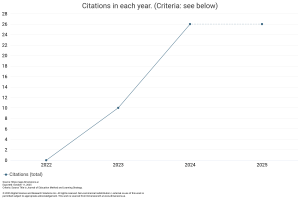Effectiveness of the Use of Media and Learning Models in Improving Students' Mathematical Communication Skills: Systematic Literature Review
DOI:
https://doi.org/10.59653/jemls.v2i03.967Keywords:
mathematical communication skills, learning media, learning modelsAbstract
SLR is researched to describe and find out the level of students' numerical communication capacity. Several parties have utilized a variety of learning materials and learning models to achieve the desired goals. The purpose of this study is to find out which learning tools and models can increase the scientific capacity of students. This question is divided into two tables, namely the media table and the strategy table. Analysts use proper writing audit frameworks to investigate existing diries. From the important articles, it can be concluded that a typical learning model can be utilized in learning materials aimed at supporting the advancement of scientific communication skills.
Downloads
References
Ahmad, M., & Nasution, D. P. (2018). Qualitative analysis of students' mathematical communication skills who are given realistic mathematics learning. Gantang Journal, 3(2), 83-95.
Arfah, U., & Effendi, K. N. S. (2022). Students' mathematical communication skills on quadrilateral and triangular materials. Journal of THEOREMS (The Original Research of Mathematics), 7(1), 40-52.Desanti, L. A., Lestari, S. A., Purwaningsih, D., & Damariswara, R. (2023). Analysis of Difficulties of Elementary School Students in Mathematics Subjects. Journal of Elementary Education Flobamorata, 4(3), 747-752.
Chen, S., et al. (2021). Integrating interactive media with problem-based learning for enhancing mathematical communication skills. International Journal of Mathematics Education, 27(4), 589-602.
Johnson, A. (2018). Enhancing mathematical communication through video-based learning. Mathematics Teaching Techniques, 25(3), 112-125.
Jusniani, N., & Nurmasidah, L. (2021). Application of generative learning model to improve students' mathematical communication skills. Scientific Journal of Realistic Mathematics, 2(2), 12-19.
La'ia, H. T., & Harefa, D. (2021). The relationship between mathematical problem-solving skills and students' mathematical communication skills. Script: Journal of Non-Formal Education, 7(2), 463-474.
Mahadewi, N. K. N., Ardana, I. M., & Mertasari, N. M. S. (2020). Mathematical Communication Skills Through Interactive Media-Assisted Reciprocal Teaching Model. JNPM (National Journal of Mathematics Education), 4(2), 338-350.
Marliani, N. (2015). Improving students' mathematical creative thinking skills through the missouri mathematics project (MMP) learning model. Formative: Scientific Journal of Mathematics and Natural Sciences Education, 5(1).
Nasrullah, A. (2017). The Effectiveness of the Use of Edmodo Media in Economic Mathematics Learning on Mathematical Communication: Edmodo; Effectiveness; mathematical communication; attitude. Symmetry: Pasundan Journal of Research in Mathematics Learning and Education, 2(1), 1-10.
Nur, F. (2022). Development of mathematics learning. Nas Media Pustaka.
Permatasari, K. G. (2021). Problems of mathematics learning in elementary schools/madrasah ibtidaiyah. Journal of Pedagogy, 14(2), 68-84.
Purwanti, B. (2015). Development of mathematics learning video media with the assure model. Journal of education policy and development, 3(1).
Riani, N. K., Husna, A., & Gusmania, Y. (2022). The Influence of Verbal Skills and Numerical Skills on Mathematical Literacy Skills. AXIOMS: Journal of Mathematics Education Study Program, 11(3), 2359-2369.
Robiana, A., & Handoko, H. (2020). The effect of the application of unomath media to improve mathematical communication skills and students' learning independence. Mosharafa: Journal of Mathematics Education, 9(3), 521-532.
Smith, J., & Boyes, E. (2017). The impact of interactive software on mathematical understanding and communication skills. Journal of Mathematics Education, 12(2), 45-58.
Yuniarti, Y. (2013). The role of teachers in improving mathematical representation skills in mathematics learning. EduHumanities| Journal of Basic Education Cibiru Campus, 5(1).
Downloads
Published
How to Cite
Issue
Section
License
Copyright (c) 2024 Teguh Prasojo, Isti Hidayah

This work is licensed under a Creative Commons Attribution-ShareAlike 4.0 International License.
Authors who publish with this journal agree to the following terms:
- Authors retain copyright and grant the journal right of first publication with the work simultaneously licensed under a Creative Commons Attribution-ShareAlike that allows others to share the work with an acknowledgement of the work's authorship and initial publication in this journal.
- Authors are able to enter into separate, additional contractual arrangements for the non-exclusive distribution of the journal's published version of the work (e.g., post it to an institutional repository or publish it in a book), with an acknowledgement of its initial publication in this journal.
- Authors are permitted and encouraged to post their work online (e.g., in institutional repositories or on their website) prior to and during the submission process, as it can lead to productive exchanges, as well as earlier and greater citation of published work (See The Effect of Open Access).
























